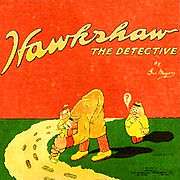Hawkshaw the Detective


Hawkshaw the Detective was a comic strip character featured in an eponymous cartoon serial by Gus Mager between 1913 and 1922 and again from 1931 to 1952. (The revival was a topper to The Captain and the Kids.)[1] The name of Mager's character was derived from the common American slang of the time, in which a hawkshaw meant a detective—that slang itself derived from playwright Tom Taylor's use of the name for the detective in his 1863 stage play The Ticket of Leave Man.
Characters and story
Sherlocko
Hawkshaw the Detective was based on one of Mager's "monk" characters (so called because they looked a lot like monkeys), "Sherlocko the Monk," who made his first appearance in 1910. That name was scrapped after Arthur Conan Doyle, the creator of Sherlock Holmes, threatened legal action over the parodied name. (Sherlocko's bumbling partner Watso did not survive the renaming, either; he became "The Colonel.")
Knocko
Groucho
An earlier version of Sherlocko, entitled Knocko the Monk, spawned a fad of nicknames ending in O, which prompted a vaudeville monologist named Art Fisher, while playing poker with four brothers who performed together, to give them all such names.[2] One of the brothers got a name that belonged to one of the characters in the strip: Groucho, one of the monks. Fisher named the other brothers Harpo, Chicko (later re-spelled "Chico") and Gummo. At various times, however, the different Marx Brothers provided different reasons for the names, so Knocko the Monk may not, in fact, have been the inspiration.
Hawkshaw
Hawkshaw the Detective, played originally by Horace Wigan,[3] debuted in the 1863 play of Tom Taylor, The Ticket of Leave Man. His character was taken up by the New York World on February 23, 1913, and continued for many years in various Pulitzer-owned newspapers. In 1917, some of Hawkshaw and the Colonel's newspaper antics were republished in book form by the Saalfield Company.
Film adaptation
In 1912 the comic strip was adapted in two live-action comedy films, The Robbery at the Railroad Station and The Henpeckos. [4]
References
- ↑ Holtz, Allan. "Obscurity of the Day: Oliver's Adventures April 15, 2010.
- ↑ Joe Adamson, Groucho, Harpo, Chico and Sometimes Zeppo: A Celebration of the Marx Brothers New York: Simon and Schuster, 1973.
- ↑ victorian.nuigalway.ie/modx/assets/docs/pdf/Vol59iTicket.pdf
- ↑ http://www.tcj.com/the-screwball-comics-of-gus-mager-hippos-monks-and-sherlock-holmes-1904-1947/
External links
- Hawkshaw at Don Markstein's Toonopedia
- Lambiek, Zoek (2004). "Gus Mager". Comiclopedia (in Dutch and English). Amsterdam: Lambiek.net. Retrieved 2010. Check date values in:
|access-date=(help)